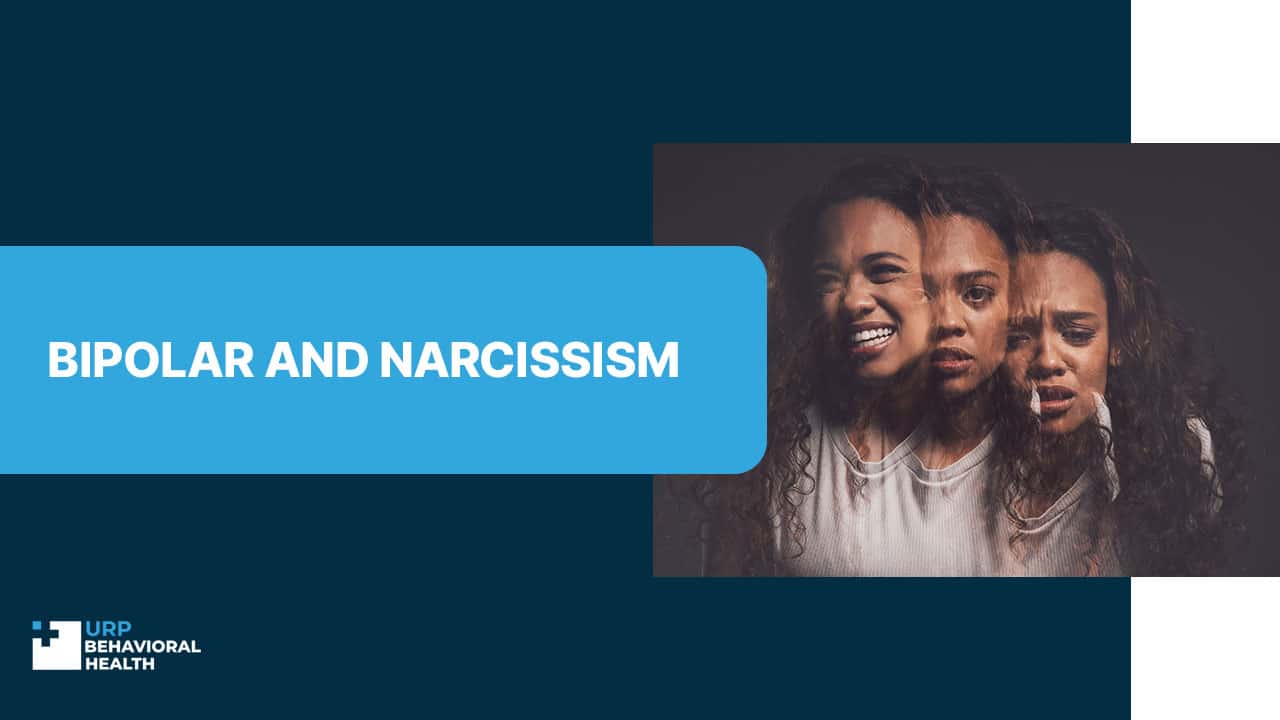
Bipolar and Narcissism
One of the most life-changing mental health issues is no doubt Bipolar Disorder. Shifts of mood, hyperarousal and periods of depression after that, impulsivity, difficulties with emotional management and relationships. All these words are familiar to BD people. Yet, Narcissists may say the same! So, let’s compare Bipolar vs Narcissism in our URP Behavioral Health blog article.
Symptoms of Bipolar Disorder and Narcissism
Why are these two MH diagnoses often mistaken? According to the study [1], the core reasons why BD is often mistaken with NPD are as follows:
- the presence of psychiatric comorbidities in people with BD;
- limitations in diagnostic criteria;
- overlapping symptoms in BD and NPD.
To understand clearly what Bipolar Disorder is and what Narcissism is, let’s check their main symptoms.
Bipolar disorder is a mood disorder characterized by three main phases: hypomania, mania, and depression. Its core symptoms are as follows [2]:
- High self-esteem, increased belief in self-importance and power, high energy, sleep deprivation, rapid thinking and talking – during higher periods;
- Signs of depression, irritability, low mood – during depressive periods.
At once, people with BD can experience psychosis, panic attacks, and extreme anxiety during all periods.
For NPD, the most characteristic features are as follows:
- High self-esteem;
- Attention-seeking behavior;
- Fantasies about abnormal success or admiration;
- Belief in one’s uniqueness and power;
- Sleep disorders;
- Constant envy and comparison of one with other people;
- Manipulative behavior with partners, family, and friends;
- Taking advantage of other people to achieve some goals.
As you can see, bipolar and narcissism have something in common, namely, the feeling of increased self-esteem, sleep deprivation, and belief in a person’s unique identity with unlimited power.
Our team will verify your insurance and design a plan tailored to your needs.

Difference Between Bipolar Disorder and Narcissistic Personality Disorder
Yet, there is a great difference between them. While in NPD, these features manifest constantly and persistently during the whole life (instead they are not corrected by a relevant therapy), in bipolar people, they occur only during hypomanic or manic phases, and when they end, a person may either feel depressed or act fully normally without exceeded self-expectations and egocentric behavior.
One more difference is in the causes of these similar symptoms. In BD, they are caused by mood swings and shifts of phases. For narcissists, these are not irregular symptoms but an integrated part of their personality.
Does Bipolar and Narcissism Go Together
That’s not typical, but a person with Bipolar Disorder can have narcissistic traits of personality. These diagnoses are not correlated but they can be comorbid.
Can Bipolar Disorder Cause Narcissism?
There are no studies 100% proving bipolar disorder may cause narcissism. Instead, some bipolar people simply show narcissistic traits during their maniac periods. At once, the possibility of being diagnosed as bipolar with narcissism also exists. These diagnoses, although both of them are recognized as mental illnesses by DSM-5, relate to different psyche mechanisms and they are induced by various causes. While bipolar disorder is genetically induced in 80%, and other causes include substance abuse, stress-related factors, and even seasonal peculiarities [3], NPD is a personality disorder with an unclear background typically related to childhood trauma, caregivers’ neglect, or, the contrary, to overprotective parenthood style. That’s why BD doesn’t cause narcissism but they can be both diagnosed in a single person.
Treatment for Bipolar and Narcissism: How to Cope With These MH Issues?
One more difference between Bipolar Disorder and NPD is the approach to their treatment.
- For bipolar patients, the main goal of chosen treatment is to reduce the symptoms of the current phase (hypomania or depression) often with medication like antidepressants and mood stabilizers, and then to apply behavioral therapy and psychotherapy to develop effective coping strategies and prevent the manifestation of acute phases in the future. Frequently, mindfulness techniques are also used to help bipolar patients to ground when they are in a maniac phase and relax when they are depressed. In the most complex cases, physiotherapy methods like ECT may also help.
- For narcissistic patients, the target of treatment is behavioral changes reached by using psychotherapy without medication management and group therapy, often also with family therapy. While bipolar symptoms can be reduced quite shortly, treating NPD is a marathon which requires years to provide personality changes. Unfortunately, not all NPD patients are prone to pass this way as they don’t recognize there is something wrong with them.
We’ll help you understand your options and guide you toward care.
Bottom Line
Although some specific traits of Bipolar Disorder and NPD intersect, they are not similar. The key thing to understanding their similarity is that Bipolar Disorder and Narcissism can be mistaken only during the manic phase of the first. At that time, bipolar patients show signs of supremacy and over-estimation of themselves. The signs which are characteristic of NPD. Yet, while Narcissism is a life-long course and it relates to Personality disorders by DMP-5, Bipolar Disorder is a mood disorder with shifting phases of mania/hypomania and depression. That’s why when you are not sure if a person is bipolar or narcissistic, you can understand it from a long-term perspective by evaluating the frequency of manifestation of core NPD features like low empathy, feeling of being unique and supreme, and impulsivity. In NPD, these features are constant while bipolar people have them only in mania/hypomania phases while during other periods, they can either have depression symptoms or live fully normal lives.
To get clear diagnostics for bipolar or narcissism, it is better to start medical evaluation in a specialized treatment center. At URP Behavioral Health, we can help you understand your mental health condition and improve it by applying evidence-based and effective treatment methods.
Resources:
- https://pmc.ncbi.nlm.nih.gov/articles/PMC2945875/
- https://www.medicalnewstoday.com/articles/321985#summary
- https://www.nhs.uk/mental-health/conditions/bipolar-disorder/
















